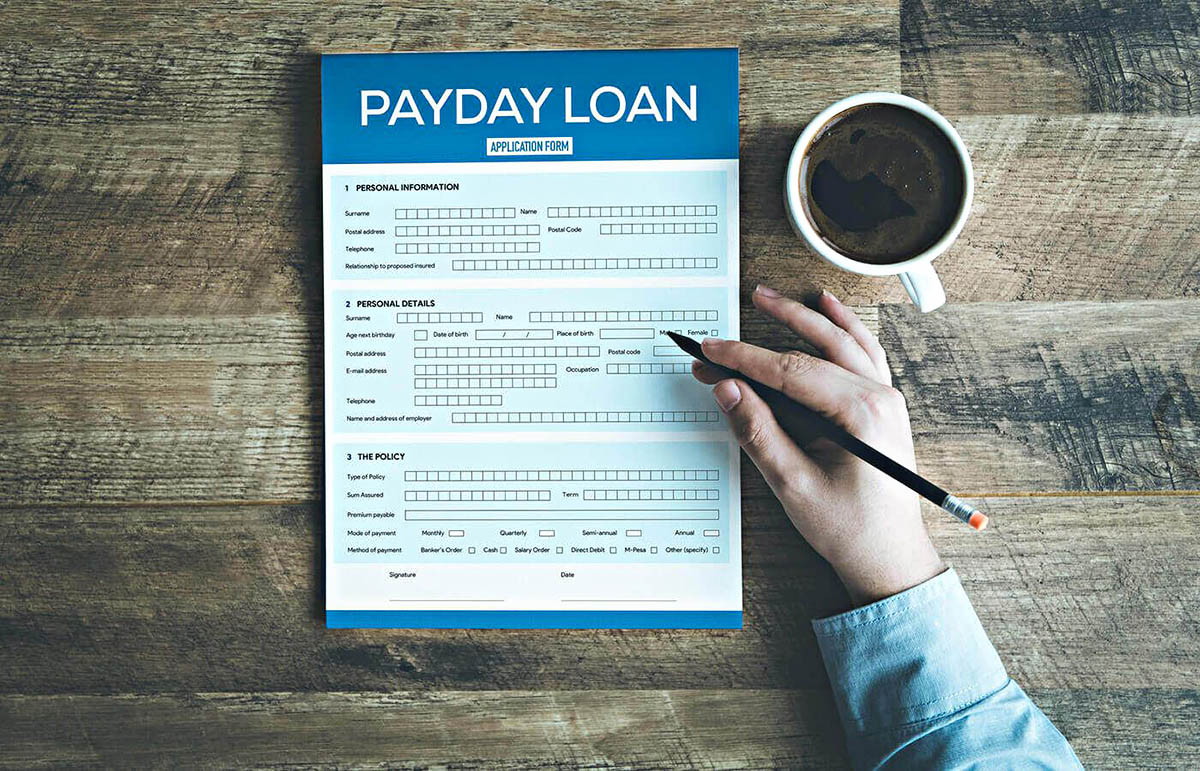

Finance
Why Should You Avoid Payday Loans?
Published: February 18, 2024
Learn why avoiding payday loans is crucial for your financial well-being. Discover better alternatives and take control of your finances today.
(Many of the links in this article redirect to a specific reviewed product. Your purchase of these products through affiliate links helps to generate commission for LiveWell, at no extra cost. Learn more)
Table of Contents
Introduction
Understanding the Pitfalls of Payday Loans
In today's fast-paced world, financial emergencies can arise when we least expect them. Whether it's a medical expense, car repair, or unexpected bill, the need for quick cash can be a stressful and daunting experience. In such situations, many individuals may consider turning to payday loans as a short-term solution. However, it's crucial to understand the potential risks and drawbacks associated with these seemingly convenient options.
Payday loans, also known as cash advances, are designed to provide individuals with immediate access to small amounts of money, typically to be repaid with high interest rates on the borrower's next payday. While these loans may appear to offer a quick fix, they often lead to long-term financial hardship and a cycle of debt that can be challenging to escape.
In this comprehensive guide, we'll delve into the various reasons why avoiding payday loans is in your best interest. From exorbitant interest rates and hidden fees to the detrimental impact on credit scores, we'll explore the pitfalls of these loans and offer alternative strategies to manage unexpected expenses without falling into the payday loan trap. Understanding these crucial aspects will empower you to make informed financial decisions and safeguard your long-term economic well-being.
High Interest Rates
The Burden of Exorbitant Interest
One of the most compelling reasons to steer clear of payday loans is the exorbitant interest rates they impose. These loans typically come with annual percentage rates (APRs) that can soar into the triple digits, far surpassing those of traditional personal loans or credit cards. The allure of quick cash may overshadow the long-term consequences of these astronomical interest rates, trapping borrowers in a cycle of debt that becomes increasingly difficult to break free from.
For individuals already facing financial strain, the burden of repaying a payday loan with such staggering interest can exacerbate their economic challenges. What may initially seem like a feasible solution to address an immediate need can quickly snowball into a relentless cycle of borrowing and repaying, ultimately leading to deeper financial distress. The compounding effect of high interest rates can swiftly transform a manageable loan into an overwhelming obligation, perpetuating a cycle of dependence on payday loans.
Moreover, the lack of regulation on payday loan interest rates in many regions allows lenders to impose predatory terms, preying on vulnerable individuals who may have limited access to more traditional forms of credit. As a result, borrowers often find themselves ensnared in a web of debt, struggling to break free from the grip of these sky-high interest rates.
By avoiding payday loans and seeking alternative means of financial assistance, individuals can evade the burden of exorbitant interest rates and safeguard their long-term financial stability. Exploring options such as negotiating payment plans with creditors, seeking assistance from local community organizations, or exploring low-interest personal loans can provide a more sustainable path to addressing financial challenges without succumbing to the pitfalls of payday loans.
Debt Cycle
The Perpetual Cycle of Borrowing
One of the most insidious aspects of payday loans is their propensity to ensnare borrowers in a perpetual cycle of debt. The structure of these loans, with their short repayment terms and high interest rates, often leads individuals to borrow repeatedly, perpetuating a cycle of financial dependency that can be exceedingly difficult to break free from.
When individuals turn to payday loans to address immediate financial needs, they often find themselves unable to repay the full amount by their next payday, prompting them to roll over the loan by paying additional fees. This extension comes with even higher interest rates, deepening the borrower’s financial burden and setting the stage for a relentless cycle of borrowing, incurring additional fees, and struggling to make ends meet.
As this cycle persists, the original loan amount can quickly spiral into a staggering sum, far surpassing the initial financial need that prompted the loan. The perpetual nature of this borrowing pattern can lead to a sense of hopelessness and financial entrapment, as individuals struggle to break free from the suffocating grip of escalating debt.
Furthermore, the psychological toll of being trapped in a debt cycle can be profound, impacting individuals’ mental well-being and overall quality of life. The constant stress and anxiety stemming from financial insecurity and the burden of unmanageable debt can permeate every aspect of a person’s life, straining relationships, diminishing productivity, and eroding overall happiness and well-being.
By recognizing the perils of falling into a debt cycle with payday loans, individuals can take proactive steps to avoid these pitfalls. Exploring alternative financial resources, such as seeking assistance from reputable credit counseling agencies, negotiating payment plans with creditors, or exploring low-interest personal loans, can provide a lifeline out of the debt cycle, empowering individuals to regain control of their financial future.
Hidden Fees
The Deceptive Nature of Concealed Charges
When considering payday loans as a solution to immediate financial needs, it’s essential to be wary of the hidden fees that often accompany these seemingly straightforward transactions. While the initial terms may appear transparent, the reality is that payday loans frequently come riddled with concealed charges that can significantly inflate the overall cost of borrowing.
One of the most common hidden fees associated with payday loans is the origination fee, which is typically deducted from the loan amount upon its issuance. This means that borrowers receive less money than they initially anticipated, further straining their financial resources. Additionally, late payment fees can quickly accumulate if borrowers are unable to meet the stringent repayment terms, compounding the already substantial financial burden.
Moreover, the practice of loan rollovers, wherein borrowers extend the loan term by paying additional fees, can lead to a deceptive cycle of borrowing, with each rollover incurring its own set of charges. This perpetuates a cycle of indebtedness, as borrowers find themselves trapped in a web of escalating fees and surcharges that far surpass the initial loan amount.
Another hidden cost that often catches borrowers off guard is the impact on their bank account. Many payday lenders require access to the borrower’s bank account for automatic withdrawals, which can result in overdraft fees if the account lacks the necessary funds to cover the repayment. These unexpected charges further exacerbate the financial strain on individuals already grappling with the burden of high-interest loans.
By raising awareness of these hidden fees and their potential impact, individuals can make informed decisions to avoid the pitfalls of payday loans. Exploring alternative financial resources, such as seeking assistance from local credit unions, negotiating payment plans with creditors, or exploring low-interest personal loans, can provide a more sustainable path to addressing financial challenges without succumbing to the deceptive nature of concealed charges associated with payday loans.
Impact on Credit Score
The Enduring Consequences of Payday Loans on Creditworthiness
While the immediate relief provided by payday loans may seem like a lifeline during times of financial strain, it’s essential to consider the long-term ramifications, particularly in relation to one’s credit score. The utilization of payday loans can have a lasting impact on an individual’s creditworthiness, potentially hindering their ability to secure favorable terms for future loans, mortgages, or credit cards.
Unlike traditional loans or lines of credit, payday loans are typically not reported to the major credit bureaus unless they are defaulted upon. This may give the impression that these loans have no bearing on one’s credit history. However, the absence of positive reporting can be detrimental, as responsible repayment behavior is not reflected in the borrower’s credit profile, depriving them of the opportunity to build a positive credit history.
Conversely, if a payday loan defaults and is sent to collections, the negative impact on the borrower’s credit score can be substantial. The delinquency and subsequent collection activity can tarnish the individual’s credit report, leading to a lowered credit score and diminished creditworthiness. This can have far-reaching implications, affecting the individual’s ability to secure favorable interest rates on future loans, obtain housing or employment, and even access essential services such as utilities or insurance.
Furthermore, the reliance on payday loans may signal financial distress to potential lenders, raising red flags regarding the borrower’s ability to manage their finances responsibly. This can result in heightened scrutiny and less favorable terms when seeking credit in the future, perpetuating a cycle of limited access to affordable financial products.
By recognizing the enduring consequences of payday loans on credit scores, individuals can make informed decisions to protect their financial well-being. Exploring alternative financial resources, such as seeking assistance from reputable credit counseling agencies, negotiating payment plans with creditors, or establishing a savings buffer for emergencies, can help mitigate the impact on credit scores and pave the way for a more secure financial future.
Better Alternatives
Empowering Financial Stability through Sound Alternatives
Amid the allure of quick cash offered by payday loans, it’s crucial to explore alternative avenues that can address immediate financial needs without subjecting individuals to the perils of high-interest borrowing. By considering more sustainable options, individuals can safeguard their financial well-being and avoid the pitfalls associated with payday loans.
- Establish an Emergency Fund: Building a financial safety net through regular savings can provide a buffer for unexpected expenses, reducing the reliance on high-cost borrowing options.
- Seek Assistance from Credit Unions: Credit unions often offer small-dollar loans with more favorable terms than traditional payday lenders, providing a viable alternative for individuals in need of short-term financing.
- Explore Low-Interest Personal Loans: Many financial institutions and online lenders offer personal loans with competitive interest rates, enabling individuals to access the funds they need without succumbing to the exorbitant costs associated with payday loans.
- Utilize Community Resources: Local community organizations and non-profit agencies may provide financial assistance programs, budgeting support, and counseling services, offering a holistic approach to addressing financial challenges.
- Negotiate Payment Plans: When faced with financial hardship, communicating with creditors to establish manageable payment plans can alleviate immediate financial strain and prevent the need for high-cost borrowing.
By embracing these alternatives, individuals can fortify their financial resilience and avoid the detrimental consequences of payday loans. Furthermore, cultivating a proactive approach to financial management, including budgeting, saving, and seeking guidance from reputable financial advisors, can empower individuals to navigate unexpected expenses with confidence and stability.














